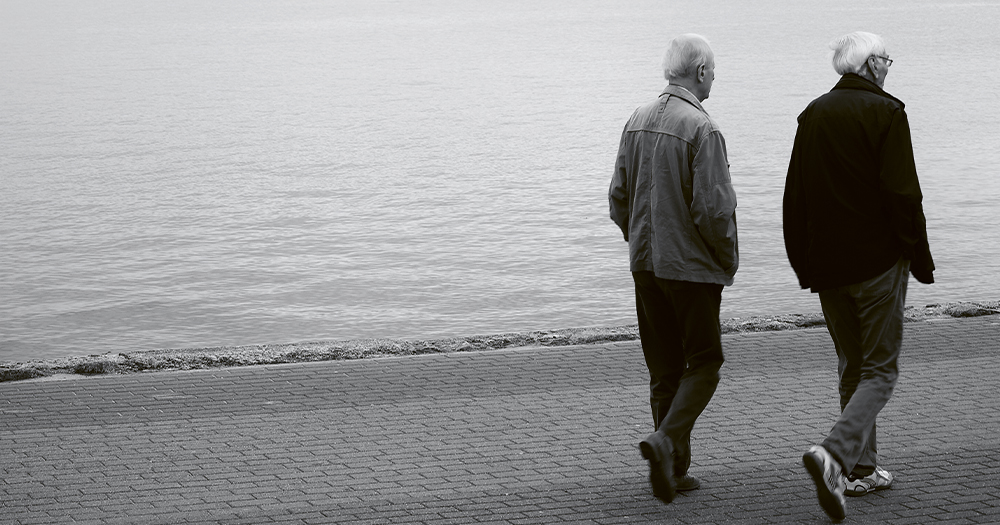“I’m determined that as I approach my end of life with this progressive disease that diminishes cognitive capacity, I want my care to be every bit as queer-centric as my life has been.”
The Irish healthcare system is renowned for its dysfunction. High trolley numbers, long waiting lists and an inefficient management structure. So there are challenges and difficulties faced by many who interact with the system. Yet for the majority of these people, they don’t have the added complication of fearing that their identity will not be accepted, of having to hide who they are, of feeling or fearing judgement from those who are supposed to be there to help.
“For older LGBT folks accessing these appropriate services, particularly for gender non-conforming folk, you know, it’s not always easy or comfortable,” says Daithí Clayton. “At my very first visit with the GP that I was assigned to here, she didn’t touch me. She’s never touched me. You know, this expression of ‘Oh, we’re all one big happy family. We treat everyone the same.’ No, you don’t. No you don’t. Especially when we come from the Stonewall generation of LGBTQIA older adults who faced criminality, you know? We were considered criminals back in the ‘70s and ‘80s or until 1993 in Ireland.
“If someone has a problem with my queerness, it’s not my problem. It’s their problem, and I don’t want to confront their problem in a healthcare setting.”
Daithí was diagnosed with early-onset Alzheimer’s five years ago and he is also battling cancer. Originally from Chicago, he moved to Ireland two years ago after feeling ‘under attack’ from Donald Trump’s administration. He became a citizen through his Irish grandmother and settled down in Youghal, Co Cork.
However, while he feels at home in Ireland, he has found aspects of the transition challenging. The local council helped set him up with a two-bedroom flat, but he is in a wheelchair and struggled with living alone due to his cancer and dementia diagnoses. Yet he shares that he got no further help from them and would go months without hearing from the public health nurse.
“I’m determined that as I approach my end of life with this progressive disease that diminishes cognitive capacity, I want my care to be every bit as queer-centric as my life has been,” he explains. “I don’t want heteronormative care imposed on me. And I’m not the only one who feels that way.”
Our wonderful @jameso_hagan chairing a panel on the needs of the older #LGBTI+ community as part of #CorkPride. The panel really highlighting the lack of visibility of LGBTI+ older people in mainstream services. #ChampionsProgramme #PrideInPractice pic.twitter.com/AOjSS3hJ0p
— LGBT Ireland (@LGBT_ie) July 31, 2021
And the limited research surrounding the topic in Ireland backs him up. Only one in three older LGBTQ+ people believed that healthcare system professionals have sufficient knowledge of LGBTQ+ issues, according to research carried out in 2014, and less than half (43 percent) felt respected as an LGBTQ+ person by healthcare professionals.
A transgender woman who was interviewed as part of a study in Ireland told the researcher: “One of the big issues is they [practitioners] don’t know the issues, can’t deal with them, have never been trained to deal with them…So there is a massive gap.”
Another difficulty is that for some older LGBTQ+ people they may not have the same familial support networks that many heterosexual people rely on for their care. The Irish homecare system relies heavily upon families providing care to patients. 90% of carers for older adults are informal or unpaid carers, 70% of whom are women (most commonly a female spouse). This reliance on female‐led, familial homecare is based on a heteronormative family ideal. This creates a system that may not readily accommodate the healthcare needs of older LGBTQ+ adults who might not have this kind of support available.
Daithí has no living family in Ireland and it was only through his LGBTQ+ networks that he was able to find someone who could help him out at home. He was put in touch with a transgender young woman who needed a place to stay after experiencing family difficulties, and the two moved in together.
“She’s my flatmate,” he says. “Now we are intergenerational, helping each other when the housing and the healthcare system failed to do so. That’s what rainbow families do for each other.”
Often this lack of recognition of LGBTQ+ people’s identities is not coming from a place of malice but from a place of ignorance. Aoife Dillon is an advanced nurse practitioner at St James’ Hospital in Dublin. After more than a decade in the healthcare system, she travelled to the Netherlands for the Being Me project, which is designed for healthcare professionals to learn how to make their care inclusive for LGBTQ+ people. She heard about older people’s past experiences with healthcare and how being gay was treated as a condition or disorder that needed to be fixed. These past traumas led some of them to be wary of the system and stopped them from going to get things checked out because they were afraid of having to reveal their identity.
“I was horrified, I spent three days in tears because I just hadn’t considered what it was like for them,” Aoife says. “I had never thought about it from a healthcare context. We all go on about how we want to be inclusive and then we’re not actually doing anything specifically to make people feel more comfortable, to make them feel welcome in our service.
“You’re supposed to be able to trust your healthcare provider and if you have a chronic illness they are supposed to be involved in your care for the rest of your life, or when it comes to end of life care or palliative care or going into residential care if you can’t live at home anymore. You have to be able to trust your healthcare provider. These people had a genuine fear.
“A lot of their biggest fear was nursing home care and that they were going to have to go back into the closet when they go into residential care. They had spent all their life hiding, or have been out and proud as an active member of the LGBT community, and then were worried that when they need help in later life that they weren’t able to be themselves, that they would have to go back into the closet because they were afraid of how they were going to be treated by other residents, or they were afraid about how they were going to be treated by staff.
“That just crushed me, I mean people have fears around nursing home care anyway, – you’re giving up your home, you’re handing yourself over to other people to provide your care, but then to add in that you’re going to worry about being discriminated against because of who you are. It just crushed me to hear that these are people’s worries.”
She has heard horror stories from colleagues of transgender people with dementia going back to living as the gender they were assigned at birth when they go into a nursing home. The question then became, well what can be done to change this?
For Daithí, he doesn’t want simply symbolic change. “Well, you know what, I don’t want a fucking rainbow at the GP’s office. I want a big honkin, bold dyke nurse waving a Fleet enema bag. That’s what I want,” he laughs before turning more serious. “Just widen the lens in 2021. I’d like people, all healthcare providers, to be comfortable with pronoun usage. That’s not rocket science. It’s the English language. And most people in Ireland speak it. Just be comfortable with that and respectful of the entire rainbow of diversity in the LGBTQIAP+. I mean, I’ve got dementia, but I still managed to remember all of those letters, because, you know, the purpose of it, after all, is inclusion.”
Having had her eyes opened, Aoife knew that she had to proactively help bring about change in the healthcare system. She got involved in the Champions Programme which is run by LGBT Ireland and aims to raise awareness around the issues affecting older LGBTQ+ people and to educate healthcare staff. Aoife thinks the work they do is vital and makes a real difference. However, their workshops are often voluntary and there is no mandatory training about LGBTQ+ issues in any undergraduate programme for healthcare professions in Ireland, or throughout placements, or indeed when they join a hospital in a full-time capacity.
“If you put training out just for people to voluntarily come, you tend to get people in the room who are interested and who are already trying to change and want to make their practice better,” says Aoife. “But you’ll never catch everybody and you won’t catch the people who are not interested and sometimes it’s not the ones who are willing to change that you want to catch, it’s other people who would never willingly attend.”
For Daithí, and all those in a similar situation, it is simply about being seen and respected for their identities when engaging with health services. “I’d like to spend the end of my life playing some drag queen bingo, and there’s nothing wrong with that. I want it in a queer context, aging in a queer context.”
© 2021 GCN (Gay Community News). All rights reserved.
This article was published in the print edition Issue No. 367 (July 1, 2021). Click here to read it now.
Support GCN
GCN is a free, vital resource for Ireland’s LGBTQ+ community since 1988.
GCN is a trading name of National LGBT Federation CLG, a registered charity - Charity Number: 20034580.
GCN relies on the generous support of the community and allies to sustain the crucial work that we do. Producing GCN is costly, and, in an industry which has been hugely impacted by rising costs, we need your support to help sustain and grow this vital resource.
Supporting GCN for as little as €1.99 per month will help us continue our work as Ireland’s free, independent LGBTQ+ media.

